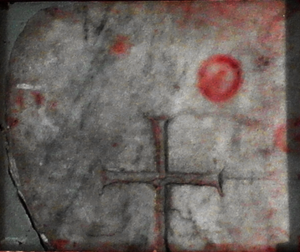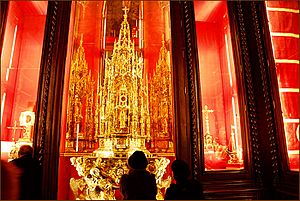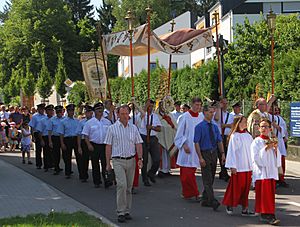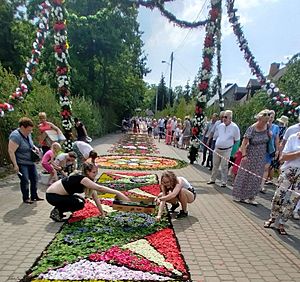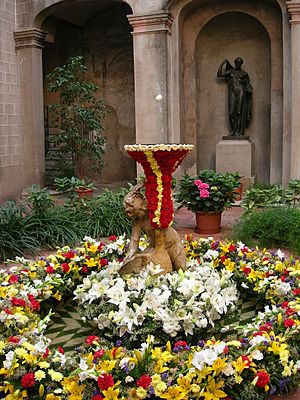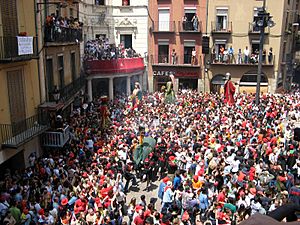Feast of Corpus Christi facts for kids
Quick facts for kids Solemnity of The Most Holy Body and Blood of Christ |
|
|---|---|
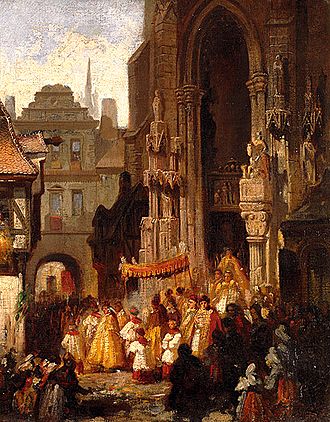
Corpus Christi procession. Oil on canvas by Carl Emil Doepler
|
|
| Also called | Corpus Domini |
| Observed by | as a public holiday in Austria, Brazil, Bolivia, Bosnia and Herzegovina, Colombia, Croatia, Dominican Republic, Haiti, East Timor, Equatorial Guinea, parts of Germany, Grenada, Liechtenstein, Malta, Mexico, Monaco, Panama, Peru, Poland, Portugal, Philippines, Saint Lucia, San Marino, parts of Spain, parts of Switzerland, Trinidad and Tobago |
| Type | Catholic |
| Date | Thursday after Trinity Sunday; 60 days after Easter, or the Sunday immediately following this |
| 2025 date | June 19 |
| Frequency | Annual |
The Feast of Corpus Christi is a special Christian holiday. It is also known as the Solemnity of the Most Holy Body and Blood of Christ. This day celebrates the belief that Jesus is truly present in the Eucharist. The Eucharist is the bread and wine used in Holy Mass (also called Holy Communion).
This feast is celebrated by the Latin Church (which is part of the Catholic Church). Some Western Orthodox, Lutheran, and Anglican churches also observe it.
The idea for Corpus Christi came from Thomas Aquinas. He was a very wise church teacher. He suggested it to Pope Urban IV in the 1200s. They wanted a special day just to celebrate the joy of the Eucharist. This was different from Maundy Thursday, which also remembers the Eucharist but is a more serious day leading up to Good Friday.
In 1264, Pope Urban IV made Corpus Christi an official holiday for the entire Roman Catholic Church. This happened after a special event in Bolsena, Italy, called the Eucharistic Miracle of Bolsena.
The feast is usually celebrated on the Thursday after Trinity Sunday. Trinity Sunday is 60 days after Easter. In some places, if it's not a public holiday, it is celebrated on the Sunday after Trinity Sunday.
After Mass on Corpus Christi, there is often a procession. People carry the Blessed Sacrament (the consecrated bread) in a special holder called a monstrance. This procession is a way to show honor to Jesus. It often ends with a special blessing called Benediction of the Blessed Sacrament.
In some places, people hang special wreaths made of flowers on their doors and windows. These are called Corpus Christi wreaths.
Many Protestant churches stopped celebrating Corpus Christi during the Protestant Reformation. This was because they had different beliefs about Jesus's presence in the Eucharist. Today, most Protestant groups do not observe this day. However, some Lutheran churches and the Church of England do celebrate it. The Church of England sometimes calls it "Thanksgiving for Holy Communion."
Contents
History of the Feast
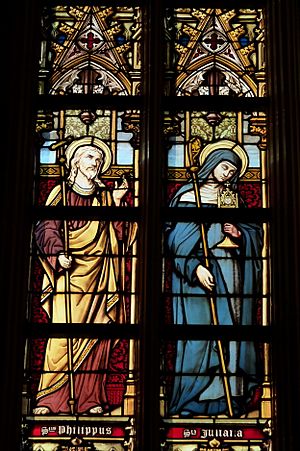
The idea for Corpus Christi began with a woman named Juliana of Liège. She was a nun who lived in Belgium in the 1200s. Juliana had a very special love for the Blessed Sacrament.
She always wanted a special feast day to honor the Eucharist. This desire grew stronger after she had a vision in 1208. In her vision, she saw the church as a full moon with one dark spot. This spot meant that a feast honoring the Eucharist was missing.
Juliana kept her vision a secret for 20 years. When she finally told her confessor, he shared it with the local bishop.
The local bishop, Robert de Thorete, agreed to her request. In 1246, he ordered that Corpus Christi be celebrated every year in his area. The first celebration happened at St Martin's Church in Liège that same year.
Later, a church leader named Hugh of St-Cher helped spread the feast. He made it a celebration for a larger region in 1252.
Another important person was Jacques Pantaléon of Troyes. He had been a church official in Liège. When he became Pope Urban IV in 1264, he made Corpus Christi a feast for the entire Latin Church. He announced this in a special letter called a papal bull, Transiturus de hoc mundo.
Even though the Pope made it a universal feast, it took about 50 years for it to be widely celebrated. It became truly widespread after Pope John XXII officially included Urban IV's letter in church law in 1317.
The main reason for this new feast was to give the Eucharist its own special day. On Maundy Thursday, many other important events are remembered. These include Jesus washing his disciples' feet and the start of the priesthood. Because of this, the focus on the Eucharist could get lost. Corpus Christi was created to focus only on the Holy Eucharist.
Thomas Aquinas also wrote beautiful hymns for the feast of Corpus Christi. These include Pange Lingua and Lauda Sion Salvatorem. Parts of these hymns are still sung today during special services.
How Corpus Christi is Celebrated
Roman Catholic Church
Corpus Christi is a very important day in the Catholic Church. In many countries, Catholics must attend Mass on this day. It is usually celebrated on the Thursday after Trinity Sunday.
On this day, or the following Sunday, many towns have a special procession. People walk through the streets, singing and praying. The consecrated host (the Eucharist) is carried in a monstrance. This is a beautiful, often golden, container. At the end of the procession, a special blessing called Benediction of the Blessed Sacrament is given.
Anglicanism
In England, the celebration of Corpus Christi was stopped in 1548. However, the Church of England now allows it to be observed. It is called "The Day of Thanksgiving for the Institution of Holy Communion."
Some Anglo-Catholic churches also celebrate Corpus Christi. They do this even if it is not officially listed in their church calendars.
Other Churches
Corpus Christi is also celebrated by the Old Catholic Church and the Liberal Catholic Church. Some Western Rite Orthodox Christians also observe it. It is also remembered in the calendars of some Eastern Catholic Churches.
Lutheranism
Martin Luther, who started the Lutheran Church, did not like the processions with the Eucharist. He thought they were "only play-acting" and "vain idolatry."
However, the feast was kept in Lutheran calendars until about the year 1600.
Calvinism
Like Lutherans, followers of the Reformed tradition (Calvinists) do not observe the feast of Corpus Christi.
Folk Traditions
The night before Corpus Christi, priests often bless special wreaths made of flowers. These Corpus Christi wreaths are hung on flags, banners, and houses. They are also placed in gardens and fields. This is done with a prayer for protection and blessings on the growing crops.
Many Christian communities have a tradition of carrying the Blessed Sacrament in a grand procession. This happens through the town after Mass on Corpus Christi Day. The monstrance holding the host is often decorated with a wreath of flowers.
During the procession, church bells ring. People often kneel outside their homes to show respect for the Eucharistic Lord. Along the route, houses are decorated with small birch trees and green branches. Candles are lit in the windows. Stops are often made at different points. Here, the Blessed Sacrament is placed on an altar table. A passage from the Gospel is read, hymns are sung, and prayers are offered.
Brasil and Portugal
In Brazil and Portugal, people create beautiful street carpets for Corpus Christi. These are called Tapetes de Corpus Christi. They are made from different materials like coffee grounds, flowers, sand, and salt.
Croatia
In Croatia, the feast has many names. Some names mean "flour" or "Lord's Day."
England
In medieval times, Corpus Christi was a popular time for mystery plays. These plays told stories from the Bible. The famous plays in York, England, were performed on Corpus Christi Day for about 200 years. They stopped during the Protestant Reformation.
Peru
In the mountains of Peru, the festival of Quyllurit'i is held near Corpus Christi. Thousands of pilgrims come for this event. It celebrates the return of the Pleiades star cluster, which is important for the harvest.
Poland
In Spycimierz, Poland, people create a carpet of live flowers about one kilometer long. A special procession walks over it. This tradition of flower carpets for Corpus Christi processions was added to the UNESCO Representative List of the Intangible Cultural Heritage of Humanity in 2021.
Spain
Andalucia
The celebrations in Seville, Spain, are so famous that they are featured in a music piece by the composer Albéniz.
Castile-La Mancha
Corpus Christi is one of the main festivals in Toledo, Spain.
Castile and León
In the village of Castrillo de Murcia, a unique tradition called El Colacho (baby jumping) takes place during the celebration.
Catalonia
In Catalonia, Corpus Christi is celebrated with the tradition of the dancing egg. This tradition has been around since the 1500s.
The Patum de Berga is another popular festival in Catalonia. It happens each year during Corpus Christi. People dress up as mystical figures and perform "dances" with fire and fireworks. UNESCO recognized it as a "Masterpiece of the Oral and Intangible Heritage of Humanity" in 2005.
When is Corpus Christi Celebrated?
Corpus Christi is a moveable feast. This means its date changes each year. It is celebrated on the Thursday after Trinity Sunday. This is 60 days after Easter. If it is not a public holiday, it is moved to the following Sunday.
The earliest it can be is May 21. The latest it can be is June 24.
Corpus Christi is a public holiday in many countries. These often include countries with a large Catholic population. Some examples are Argentina, Austria, Bolivia, Brazil, Colombia, Croatia, Dominican Republic, Germany (parts of), Poland, Portugal, and Spain.
- 2022 - June 16 (Sunday observance: June 19)
- 2023 - June 8 (Sunday observance: June 11)
- 2024 - May 30 (Sunday observance: June 2)
- 2025 - June 19 (Sunday observance: June 22)
- 2026 - June 4 (Sunday observance: June 7)
- 2027 - May 27 (Sunday observance: May 30)
- 2028 - June 15 (Sunday observance: June 18)
- 2029 - May 31 (Sunday observance: June 3)
- 2030 - June 20 (Sunday observance: June 23)
See also
 In Spanish: Corpus Christi para niños
In Spanish: Corpus Christi para niños
 | Tommie Smith |
 | Simone Manuel |
 | Shani Davis |
 | Simone Biles |
 | Alice Coachman |


